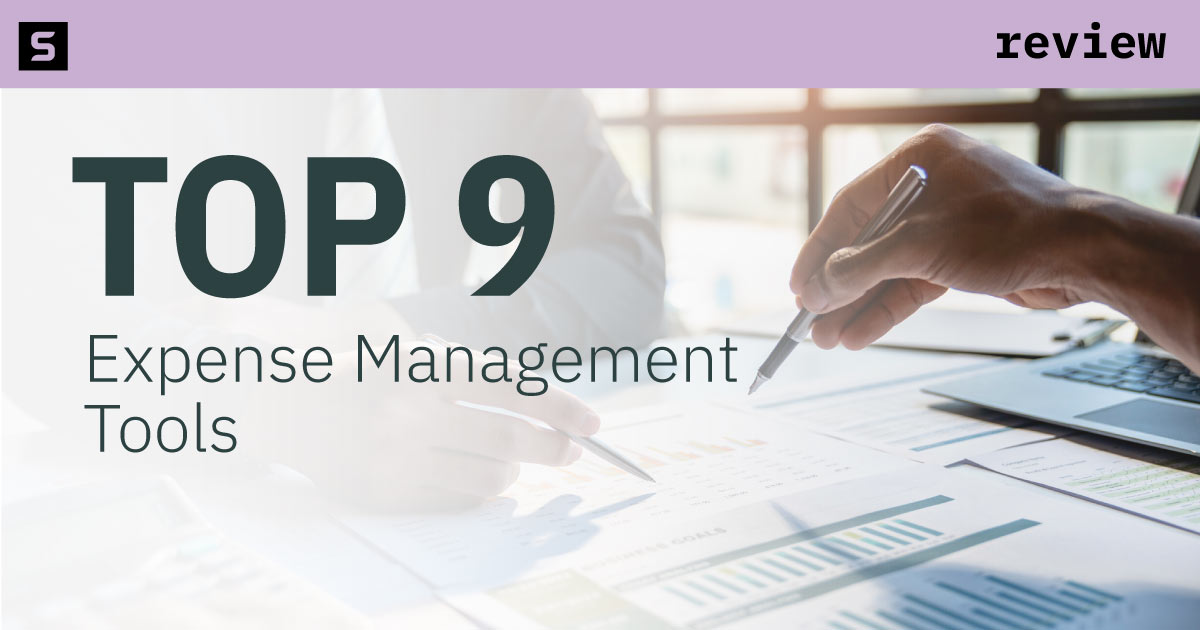9 Best Expense Management Tools for Startups (2024)

Last Updated: By Michaela Dale
Long gone are the days of keeping receipts in a shoebox stowed away for tax season. Thanks to tech advancements, startups and small businesses have a myriad of tools available to track, categorize, and manage their spending.
These are the best expense management tools for startups looking to upgrade their spend monitoring, eliminate overspending, and ensure compliance during tax season.
Recommended: Streamline your expense management with BILL's automated platform. Get started today.
Top Expense Management Tools for Startups
Expense management or spend management tools are valuable additions to any business’s financial tech stack. At the basic level, expense management software should help a business organize its expenses and prepare for tax season.
However, the platforms we’ve included below go much farther than simply categorizing expenses. Whether you’re looking to automate reconciliation for global travel expenses or enforce spend policies while reducing manager-employee friction, these expense management tools have the features you need to effectively manage your startup’s spending.
- Best Expense Management Tool Overall: BILL
- Best for Venture-Backed Startups: Brex
- Best for Small Businesses: Relay
- Best for Spend Management: Ramp
- Best for Global Teams: Rippling
- Best Ease of Use: Expensify
- Best Suite of Financial Tools: Tipalti
- Best for Business Travel: Zoho Expense
- Best for Large Companies: Airbase
Take Control of Your Expenses
Streamline your startup's expense management with the cutting-edge automation that BILL provides. With just a few clicks, you can simplify your financial operations and focus more on growing your startup.
1. BILL
BILL (previously Divvy) is a fintech company offering two products: Accounts Payable & Receivable and Spend & Expense. The latter is a robust platform that provides access to business credit, budget control, and spend management features.
With BILL, users can see their transactions in real time, which the platform automatically categorizes based on the user’s preferences. Then, they can easily review, approve, and manage all transactions — from invoices and card charges to subscriptions and more — to seamlessly monitor spending and mitigate overspending.
In order to access the platform’s suite of expense management features, startups must open a business credit card with BILL. The company offers credit limits between $500 and $5 million, and these credit card accounts include budget management tools, virtual cards, and reimbursement features in addition to BILL’s expense management features.
Notable Features
- Real-Time Expense Views: With BILL, you can track and manage transactions in real time rather than waiting until the end of the month to review expenses.
- Automatically Categorized Transactions: Transactions get automatically categorized to the user’s specifications, keeping expenses organized and streamlining expense management.
- Several Integrations: The BILL platform integrates with major software solutions such as QuickBooks, Slack, and Oracle NetSuite for a seamless workflow.
- Easy Reimbursements: Reimbursements are free on this platform, making it easy to manage off-card expenses for employees.
Pricing
BILL’s Spend & Expense product is free to use. However, you must apply for a BILL credit card in order to access the company’s expense management solution.
Pros
- Free to use
- Automatically organizes transactions for optimal ease of use
- Robust fraud protection features included
Cons
- Requires you to open a business credit card
- Features only available on expenses made with BILL credit cards
2. Brex
Brex is a robust financial management platform for venture-backed startups. It boasts features for expense management, bill pay, business bank accounts, and travel booking and management. Plus, with Brex corporate cards, businesses can spend globally and receive impressive cash-back rewards.
This platform’s expense management solutions leverage artificial intelligence (AI) to automate and enhance spend management in real time. Brex AI works as an assistant for all employees to help them manage their expenses and ensure purchases align with company policies. Plus, the feature organizes expenses by auto-generating receipts, categorizing transactions, and only flagging expenses that require human review.
Notable Features
- High Level of Customization: Users may customize spending policies based on use case, level, department, and more. Plus, they can ban purchases from specific categories or merchants.
- AI Capabilities: Brex AI automates the expense management process not only for executives and leadership, but also for the entire team.
- Bill Pay Automation: The platform automates invoice entry, approval, payment, and reconciliation to reduce errors and save time.
- Rewards for Corporate Cards: Users who opt to use Brex’s corporate card offering can earn up to seven times cash back on spending as well as expense management tools.
Pricing
Brex offers three packages: a free plan, a Premium plan at $12 per user per month, and an Enterprise plan that requires custom pricing.
Pros
- AI features reduce errors, save time, and ensure compliance with user policies
- Wide range of features span the entire financial process for startups
- High-level of control for finance teams and business owners to reduce overspending
Cons
- Startups must be venture-backed to use Brex
- Strict eligibility criteria overall
3. Relay
Relay is a fintech company offering business banking for small businesses. With a free bank account through Relay, businesses gain access to a range of features from accounts payable to expense management. Relay’s receipt management features make managing and categorizing expenses fast and simple.
On the platform, businesses can set receipt policies for employees to ensure they always meet proof of purchase requirements and compliance standards. Additionally, the platform documents each receipt so it’s ready in case of an Internal Revenue Service (IRS) audit.
Notable Features
- SMS Reminders: Relay will automatically text users to remind them to upload receipts to avoid any missing expense reporting.
- Relay Cards: Using Relay cards for work-related expenses allows employees to get reimbursed quickly and easily.
- Thorough Documentation: Relay’s platform documents receipts and expenses digitally in case of an audit or future reference requirement.
- Digital and Paper Receipt Collection: Whether it’s a physical receipt or a digital one, Relay will store and organize their contents.
Pricing
Relay offers two plans: a free plan and Relay Pro, which starts at $30 per business per month.
Pros
- Free plan available
- Easy-to-use platform
- Reminders ensure team members document receipts and proof of purchase details effectively
Cons
- Lacks features offered by some competitors
- Requires banking with Relay to use expense management features
4. Ramp
Ramp offers financial tools for businesses from corporate cards to spend management features. Its expense management product automates corporate card spending reconciliation, reimbursements, and policy enforcement.
One of the most beneficial aspects of the Ramp platform is the amount of control account owners have over their budgets, compliance guardrails, and policy-enforcement features. This helps businesses prevent overspending, understand their true costs, and gain full visibility of company and employee spending.
Notable Features
- Pre-Built Budgeting Tools: Users can create pre-set budgets for employees to avoid overspending and manage company finances effectively.
- Spending Control: With Ramp, users can easily manage spend requests to stay compliant and control the types of purchases employees may make.
- Friction-Reducing Automations: The platform automatically requests missing items and repayments as well as auto-locks cards to reduce friction between managers and employees.
- Wide Range of Integrations: Whether you want to sync spend management with your human resources (HR) software or business bank account, Ramp offers a wide range of integrations to streamline your tech stack.
Pricing
Ramp offers three packages: a free plan, Ramp Plus for $12 per user per month, and Ramp Enterprise that requires custom pricing.
Pros
- Free version available
- High level of control over spending
- Unlimited virtual cards available on all packages
Cons
- Some integrations available only with higher-cost packages
- Priority support isn’t available with the free package
5. Rippling
Rippling is a workforce management platform that covers every step of the employee lifecycle. It built its expense management services with global teams in mind, boasting features like payments in any currency and reimbursement in more than 100 countries. However, Rippling also boasts features for any startup team like its advanced spend policy engine that automatically blocks out-of-policy expenses and simplified expense approval chains.
The company offers diverse business services in addition to its expense management services, including robust HR and information technology (IT) services. Users may combine Rippling’s services into an intuitive, all-in-one platform that streamlines every aspect of the employee management process.
Notable Features
- Payments in Any Currency: Rippling enables users to pay employees in their local currency while automatically calculating and reporting on those payments in the user’s currency.
- Global Reimbursement: Users can make reimbursements in more than 100 countries for corporate expenses — ideal for global teams and business travel.
- Receipt Translation: The platform automatically translates line items and converts currencies for receipts.
- Access to a Suite of Features: Users gain access to Rippling’s HR, finance, and IT features all from one system.
Pricing
Rippling offers custom pricing with packages starting at $8 per month per user and increasing based on the services requested.
Pros
- Great for globally distributed teams
- Myriad of services available to create an optimal plan
- Automations streamline the approval and organization of expenses
Cons
- Pricing isn’t transparent due to customization
- Entirely US-based teams may not get full use of the features
6. Expensify
Expensify is a spend management system built to serve a variety of business sizes and types. This platform’s included features streamline the expense management process and work seamlessly with other tools, such as HR and accounting software. This allows users to build an efficient tech stack that encompasses the entire management process.
Expensify users gain access to much more than just expense management tools, however, because the platform also offers spend management tools, corporate credit cards, and invoicing features. Overall, Expensify is a strong choice for businesses looking for an easy-to-use expense management solution without some of the more advanced features offered by other platforms.
Notable Features
- Easy Receipt Scanning: Expensify’s SmartScan feature allows users to easily take a photo of their receipts, automatically capturing the details and including them in the expense report.
- Helpful Integrations: The platform allows users to integrate with accounting, HR, and travel tools to keep all expenses in one place.
- Spend Analytics: Users can manage and track employee and company-wide spending as well as analyze real-time trends.
- Code-Friendly Features: Users also can import general ledger (GL) codes to tag expenses and mitigate manual reconciliation of expenses.
Pricing
Expensify offers two packages: Collect, which starts at $5 per month per user, best suits teams of between one and 10 members along with Control, which starts at $9 per month per user, that suits large teams of between 10 and 1,000 employees.
Pros
- If you open a credit card with Expensify, you’ll pay 50% of the cost of the service
- The platform is highly customizable
- All features are available on an easy-to-use app
Cons
- Lacks some features offered by competitors
- User limit of 1,000 employees, making it less ideal for large enterprises
7. Tipalti
Tipalti is a finance automation company that specializes in accounts payable, mass payments, procurements, and expense tools. Its expense management platform, Tipalti Expenses, allows users to automate reconciliation for all corporate card transactions whether their employees use the Tipalti Card, Mastercard, Visa, or American Express.
The platform allows payment automations in 196 countries and 120 currencies, making it ideal for globally distributed teams and business travel reimbursements. Furthermore, Tipalti’s suite of finance automation solutions streamlines every step of managing business finances to reduce errors and save valuable time.
Notable Features
- Highly Customizable: With Tipalti, businesses can customize expense policies and implement role-based expense reviews.
- Tax Automations: For every expense, the platform automatically captures tax details and synchronizes tax codes, rates, and amounts.
- Budget Control: Users can easily eliminate overspending and gain control over their budget with Tipalti’s budget control features.
- Global Features: With 120 currencies and 196 countries available for automated payments, this platform enables users to manage globally distributed teams easily.
Pricing
Tipalti’s pricing starts at $129 per month. To determine the exact cost of Tipalti’s expense management software for your business, you must schedule a demo.
Pros
- Global payment features benefit distributed teams
- Easy-to-use interface improves employee adoption
- Integrations with major accounting software streamline the monthly close process
Cons
- More expensive than some competitors
- May include features that aren’t required for all users
8. Zoho Expense
Known for its suite of business software products, Zoho also offers expense management software — Zoho Expense — built for travel and business expense automation and management. With built-in control capabilities that allow business owners to better manage employee spending, this software prevents overspending during business travel.
Many of the Zoho Expense platform’s included features help companies manage travel spending, such as automatic currency conversion, per diem expense guardrails, and automated expense itemization. Therefore, this platform will suit businesses that have a high amount of employee travel.
Notable Features
- Mileage Tracking: Zoho Expense automatically tracks mileage and implements a user’s mileage policies.
- Automatic Receipt Capture: This platform automatically scans and includes receipts in expense reports. It also automatically converts email receipts and reservations into expense reports.
- Split Expenses: Employees can split expenses for shared spending, such as hotels and dining during business travel.
- Customized Daily Spending: Zoho Expense makes it easy for business owners and leaders to manage daily employee spending by setting customized parameters.
Pricing
You can choose from four Zoho Expense packages: free, Standard at $4 per user per month, Premium at $7 per user per month, and a custom pricing package.
Pros
- Free plan available
- No platform-specific credit card required
- Ideal for international business travel
Cons
- May not suit businesses with few travel expenses
- Premium customer support is an added cost
9. Airbase
Airbase is a spend management solution built to help large, established companies gain control over their employee spending, procurement, and bill payments. It also enables businesses to access corporate credit cards on its platform.
The Airbase expense management platform leverages generative AI and machine learning (ML) to automatically extract and organize information from receipts, and then assign purchase purposes based on past patterns. Overall, the Airbase platform is a strong choice for tech-backed automations that save business owners and their management staff time they’d otherwise spend on approvals and expense organization. It also helps users eliminate overspending and uphold their policies.
Notable Features
- Tech-Based Receipt Scanning: With the Airbase app, users can easily scan reports and allow ML and AI features to extract fields and organize information on expense reports.
- Audit Trail: Airbase captures expense details in real time and compiles them into a log of all receipts, notes, and documentation for optimal visibility.
- Automated Reimbursements: With set policies and secured approvals, Airbase enables entirely automated reimbursements to save managers’ time.
- Policy Enforcement: When employees make out-of-policy requests, the platform flags or blocks them and gives employees the relevant information to refine their request.
Pricing
Airbase doesn’t include pricing on its website. However, you can request a quote from the company for one of three packages: Standard (for up to 200 employees), Premium (for up to 500 employees), or Enterprise (for up to 5,000 employees).
Pros
- AI features enhance the expense management experience
- High level of visibility for business owners and managers
- Integrations with travel software makes setting spend limits and policies simple
Cons
- Fewer global payment and reimbursement capabilities than competitors
- May only be ideal for large organizations
Frequently Asked Questions
What is the best software for keeping track of expenses?
The best expense management software to track your business expenses will depend largely on your budget and the features your business may benefit from the most with an expense management tool. Our overall pick for spend management software is BILL, which provides a robust suite of features and functionality that make it ideal for a wide range of business types.
How do I track startup expenses?
Business owners can track expenses using spreadsheets and strictly document all spending with effective receipt storage. However, expense management software that automatically tracks and categorizes business expenses can provide a more efficient solution.
What is expense management software?
Expense management software automates the process of storing, categorizing, and reconciling expenses for businesses. Many of these tools include features that automate reimbursement for employees and funnel expense data into tax and accounting software.


